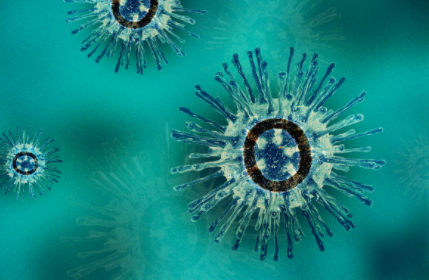The Omicron Variant

February 25, 2022
The Omicron is a variant of the Coronavirus. When it first emerged, it was the new topic of discussion. It was close to the opposite of the Delta variant, less deadly, but very contagious. According to a recent New York Times article, the Omicron variant might be milder than originally thought. “The latest evidence about Covid is largely positive. A few weeks ago, many experts and journalists were warning that the initial evidence from South Africa — suggesting that Omicron was milder than other variants, might turn out to be a mirage. It has turned out to be real.” There are three ways the omicron variant seems milder.
The first reason Omicron seems milder is because of less hospitalization. “Somebody infected with Omicron is less likely to need hospital treatment than somebody infected with an earlier version of Covid.” An analysis of patients from Houston, proved that patients that had the Omicron variant were only about ⅓ as likely to need hospitalization rather than Delta patients. Even though this is true, cases continued to rise because Omicron was so contagious.
Another reason Omicron is believed to be milder is milder symptoms. Many people were being sent into hospitals because Omicron is so contagious, but the symptoms were consistently midler. One reason people believe this is true is because Omicron does not travel to the lungs, unlike other COVID variants.
The last reason that the Omicron variant is believed to be milder is because of the deaths. “In the U.S., mortality trends typically trail case trends by about three weeks — which means the Omicron surge, which began more than a month ago, should be visible in the death counts. It isn’t yet.” Even with this being true, cases have spiked and many Americans didn’t know what to think.
Dr. Leana Wen believes that there needs to be a line between bringing lockdowns back and allowing Omicron to spread. “‘It’s unreasonable to ask vaccinated people to refrain from pre-pandemic activities,” Wen said. “After all, the individual risk to them is low, and there is a steep price to keeping students out of school, shuttering restaurants and retail shops and stopping travel and commerce.’”
It is important to wear masks because it affects not only your health but the health of the people around you. Let’s say you don’t wear a mask, and you sneeze or cough. It helps to cover with your elbow, but it doesn’t do everything, and you still have a high potential of getting someone else sick. It’s also important to wear your mask the proper way, covering your nose and mouth. If it doesn’t cover your nose, it’s not much good! This is the same reason it’s important to keep your mouth on, even when you need to sneeze or cough. The best masks to wear are the KN95 or the N95. “A properly worn N95 respirator can filter out up to 95% of particles in the air, thanks to its tight fit and synthetic material, which is made up of a web of tiny fibers charged with electrostatic energy.” “Surgical masks do not fit as tightly and provide significantly less filtration than N95s, according to a 2020 study published in JAMA Internal Medicine.”
It’s also important to be vaccinated and get the booster shot if you are old enough and eligible! “Vaccines can also help prevent serious illness and death.” Getting COVID is rough for a short period of time, which sucks on its own, but what many people don’t realize is that it can also have long-term problems. Vaccines help with this! The “Johnson & Johnson” vaccine means you only need to get one shot, unlike the “Moderna” and “Pfizer”, which need two shots.
Omicron is spreading faster than any other variant of COVID-19 so far. This is partly due to the fact that it has more mutations, and they are in the spike protein, which relates to how the virus is spread. This new variant is causing more people to be infected by the virus. Surprisingly though, it has only caused a slight uprise in hospitalization. The symptoms include cough, fever and fatigue. Some people lose their sense of taste or smell, but this is less common in Omicron than other variants. The symptoms last on average up to two or three weeks. Omicron does not cause extremely serious symptoms either, such as pneumonia, and this is why there is not much of an increase in hospitalization. But even if you don’t face severe problems, make sure to be careful and wear your mask.
According to the CDC, Omicron likely spreads more easily than the original COVID-19 virus. It is much more contagious compared to the Delta variant. Although vaccines are incredibly important, they do not work very well against Omicron. The vaccines are still important to get, but not completely effective against Omicron like it is effective against other variants. But having a vaccine is better than not having one; it will still protect you. It is encouraged that everyone get all doses of the vaccines, including the booster shot. But you can still get Coronavirus if you have a shot, though the vaccine decreases your chances. You should still get tested, and stay at home if you feel sick. And getting a vaccine is also not an excuse not to wear your mask. Stay safe, wear your mask, social distance, isolate if needed, get tested, stay clean, wash your hands, and all of the other precautions. If you can, try to get some of the more effective masks, such as KN95 or N95.
There are also new at-home COVID tests available! Every house is eligible to get four tests. These tests are completely free, and they will usually ship within 7-12 days. These at-home COVID tests are helpful, but not always accurate. If you test negative, you should test again within a few days. Make sure there are at least 24 hours between the tests! The delivery started in January 2022, and they are available now.
If you have been near anyone who is suspected of having this virus, then isolate yourself and get tested. Even if the test hasn’t come back yet, make sure not to go to school, work, or anywhere else where you are exposing yourself to others. Even though COVID is scary, and this new Omicron variant is also scary, there are ways to prevent getting it, such as wearing masks and getting vaccinated. Stay safe out there!
Citations:
https://messaging-custom-newsletters.nytimes.com/template/oakv2?campaign_id=9&emc=edit_nn_20220105&instance_id=49441&nl=the-morning&productCode=NN®i_id=54686842&segment_id=78706&te=1&uri=nyt%3A%2F%2Fnewsletter%2F4dfbfdc5-1714-502f-94cf-55ef523392cd&user_id=bde5ab3cc9b4378d62ec514312d1791c
https://health.ucdavis.edu/coronavirus/covid-19-information/omicron-variant
https://time.com/6139169/n95-best-mask-omicron-covid-19/
https://www.cdc.gov/coronavirus/2019-ncov/vaccines/vaccine-benefits.html#:~:text=Getting%20vaccinated%20against%20COVID%2D19,ages%205%20years%20and%20older.
https://www.cms.gov/how-to-get-your-at-home-OTC-COVID-19-test-for-free
https://www.covidtests.gov/


